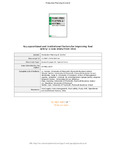Key operational and institutional factors for improving food safety: a case study from Chile
| dc.contributor.author | Lu, H | |
| dc.contributor.author | KUMAR MANGLA, SACHIN | |
| dc.contributor.author | Fernandez, JE | |
| dc.contributor.author | Elgueta, S | |
| dc.contributor.author | Zhao, G | |
| dc.contributor.author | Liu, Shaofeng | |
| dc.contributor.author | Hunter, Lise | |
| dc.date.accessioned | 2020-06-04T15:06:22Z | |
| dc.date.issued | 2020-07-24 | |
| dc.identifier.issn | 0953-7287 | |
| dc.identifier.issn | 1366-5871 | |
| dc.identifier.other | 1796137 | |
| dc.identifier.uri | http://hdl.handle.net/10026.1/15736 | |
| dc.description.abstract |
The worldwide demand for safe food is increased due to the population growth and the improvement of living standards. Different global standards are relevant in the food value chain including education and training of human resources, government regulations and surveillance. Different factors related to food safety risks in production can be taken into consideration in developing economies. Achieving food safety needs a highly integrated system in food supply and operations management. To meet demand for safe and higher quality food, food organisations especially in developing nations like Chile face numerous problematic issues. In terms of dynamic capabilities, this study takes account of supply chain re-conceptualisation, co-evolving and reflexive supply chain control. In this paper, we identify and prioritise key institutional and operational factors for improving the food safety in Chile. The factors were analysed using a Fuzzy analytic hierarchy process for illustrating the significance of key criteria to food safety concepts under uncertain environment. We provides a detailed and prioritised criteria for improving food safety practices, helping managers to understand the operational and institutional environment and makes a contribution to inform food organisations and government policy-making to reduce food losses and improve sustainability of food chains under fuzzy situations. | |
| dc.format.extent | 0-0 | |
| dc.language | en | |
| dc.language.iso | en | |
| dc.publisher | Taylor & Francis | |
| dc.subject | Food supply chain management | |
| dc.subject | food safety | |
| dc.subject | operational and institutional factors | |
| dc.subject | Fuzzy AHP | |
| dc.subject | Chile | |
| dc.title | Key operational and institutional factors for improving food safety: a case study from Chile | |
| dc.type | journal-article | |
| dc.type | Journal Article | |
| plymouth.author-url | https://www.webofscience.com/api/gateway?GWVersion=2&SrcApp=PARTNER_APP&SrcAuth=LinksAMR&KeyUT=WOS:000551602000001&DestLinkType=FullRecord&DestApp=ALL_WOS&UsrCustomerID=11bb513d99f797142bcfeffcc58ea008 | |
| plymouth.issue | 14 | |
| plymouth.volume | 0 | |
| plymouth.publication-status | Published | |
| plymouth.journal | Production Planning and Control | |
| dc.identifier.doi | 10.1080/09537287.2020.1796137 | |
| plymouth.organisational-group | /Plymouth | |
| plymouth.organisational-group | /Plymouth/Faculty of Arts, Humanities and Business | |
| plymouth.organisational-group | /Plymouth/Faculty of Arts, Humanities and Business/Plymouth Business School | |
| plymouth.organisational-group | /Plymouth/REF 2021 Researchers by UoA | |
| plymouth.organisational-group | /Plymouth/REF 2021 Researchers by UoA/UoA17 Business and Management Studies | |
| plymouth.organisational-group | /Plymouth/REF 2021 Researchers by UoA/UoA17 Business and Management Studies/UoA17 Business and Management Studies MANUAL | |
| plymouth.organisational-group | /Plymouth/Users by role | |
| plymouth.organisational-group | /Plymouth/Users by role/Academics | |
| dcterms.dateAccepted | 2020-01-10 | |
| dc.rights.embargodate | 2021-7-24 | |
| dc.identifier.eissn | 1366-5871 | |
| dc.rights.embargoperiod | Not known | |
| rioxxterms.versionofrecord | 10.1080/09537287.2020.1796137 | |
| rioxxterms.licenseref.uri | http://www.rioxx.net/licenses/all-rights-reserved | |
| rioxxterms.licenseref.startdate | 2020-07-24 | |
| rioxxterms.type | Journal Article/Review |


